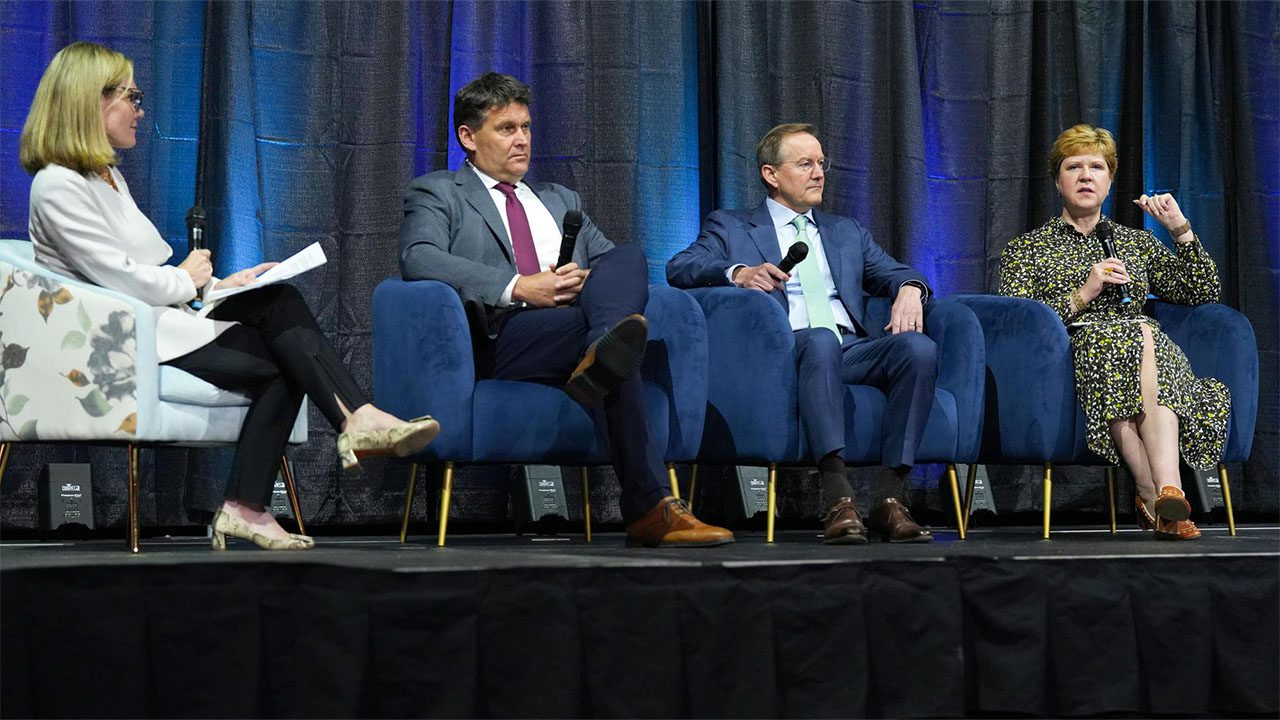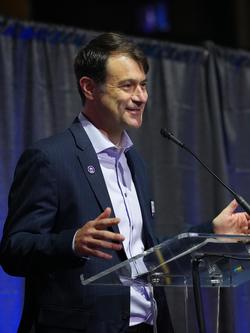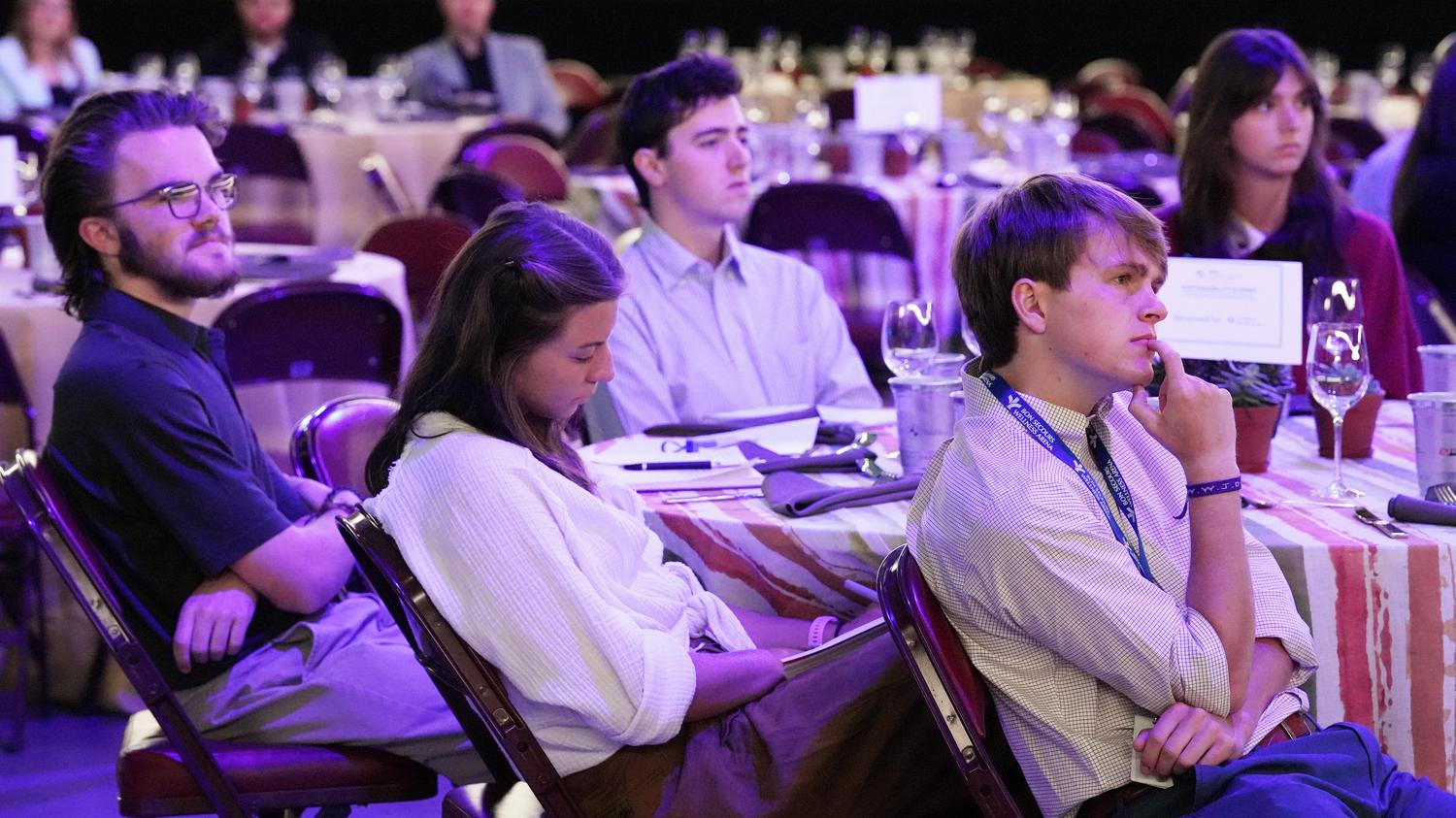Furman drives the conservation conversation at sustainability summit

The message at the Sustainability in Business summit on Friday, June 9, was clear: South Carolina is at the intersection of commerce and conservation – and The Shi Institute for Sustainable Communities at Furman University is driving the sustainability conversation.
The summit, presented by The Shi Institute in partnership with Piedmont Natural Gas, was hosted in Bon Secours Wellness Arena by the BMW Charity Pro-Am and Sustain SC.

Andrew Predmore, executive director of The Shi Institute for Sustainable Communities at Furman University, opens the Sustainability in Business Summit at the Bon Secours Wellness Arena in Greenville on Friday, June 9, 2023.
Seated around one of 35 tables in the arena was a group of Furman Student Sustainability Fellows, who were there to listen to speakers and panelists such Furman University President Elizabeth Davis and Andrew Predmore, executive director of The Shi Institute.
Dozens of representatives from leading South Carolina corporations such as Milliken & Company, BMW Manufacturing and Michelin also attended. Several of them were Sustainability Leadership Initiative (SLI) Fellows, graduates of a program led by The Shi Institute and Sustain SC.
“This kind of event is important because we are not going to make any progress on these big systemic issues without some thoughtful convening,” said Predmore, who described sustainability as “a human challenge” and said: “Regardless of how the discussions go, what happens here are connections that otherwise wouldn’t happen because these challenges are so big and diverse.”

Furman University students who are involved at The Shi Institute for Sustainable Communities listen as a panel discussion is held during the Sustainability in Business Summit at the Bon Secours Wellness Arena in Greenville on Friday, June 9, 2023.
Beyond learning directly from industry experts about the latest in sustainability efforts, such as supply chain management and carbon footprint reduction, there was an overall lesson that Predmore hoped the Shi Sustainability Fellows would take from the event.
“In South Carolina, there is movement on these things,” he said. “Furman students don’t have to go to California or D.C. or Denver to make a difference.”
In fact, as the audience heard from Davis, Furman students, faculty and staff are already making a difference without even leaving campus.
The university maintains a Gold rating in the Sustainability Tracking, Assessment & Rating System (STARS) of the Association for the Advancement of Sustainability in Higher Education (AASHE) since 2015, said Davis. Furman is rated third among baccalaureate institutions by AASHE, and it is the only Top 10 school in the Southeast.
For Davis, this shows that sustainability is not just an academic subject at Furman.
“That’s an accountability measure, to be sure,” said Davis, who was part of a panel that also included the CEOs of BMW Manufacturing and Milliken & Company. “We’re living up to what we’re actually teaching our students.”
In addition to the school’s many sustainability initiatives, Davis also stressed the importance of education, noting Furman’s Bachelor of Science degree in sustainability sciences – the first such degree offered by a liberal arts and sciences institution in the U.S.
The university has also included a course addressing humans and the natural environment in its general education requirements for all students, said Davis. About 30% of the courses in Furman’s course catalog address sustainability in some way, she added.
“Sustainability thinking really encompasses every part of any organization,” Davis said.
Education is the key to making that thinking take hold, she told the audience, whether it’s participating in SLI, asking faculty to share their expertise, or inviting more Student Sustainability Fellows into an organization to hone their professional skills.
“There are a lot of employees who want to do good work; they just don’t know how to do it,” Davis said. “The greatest opportunity is to begin spreading the understanding of what it means to engage in sustainable practices.”
“There’s a lot of work to do, and there’s a lot at stake,” Predmore told the audience. “But the good news is that we’ve got a lot of solutions, abilities, organizations and technologies here, and the future is in our hands to make the changes that we need.”